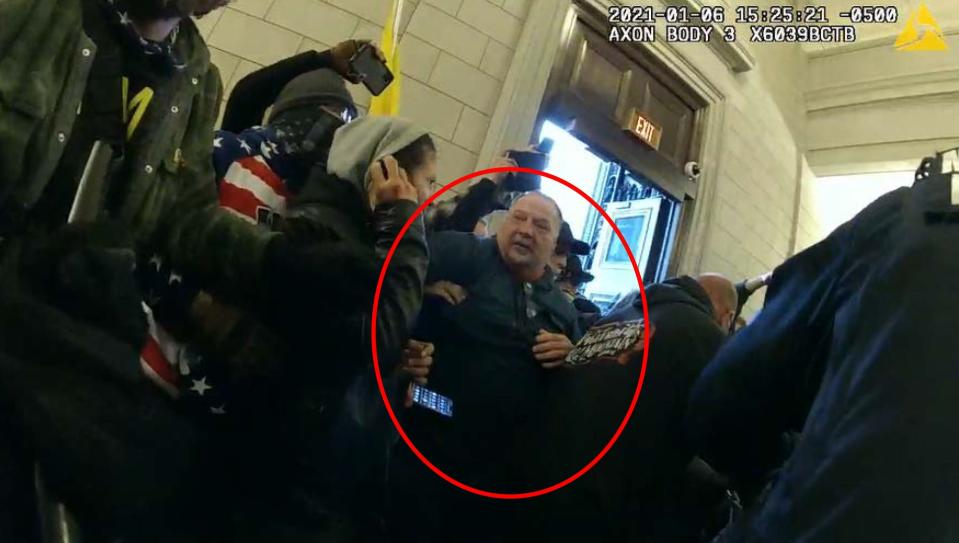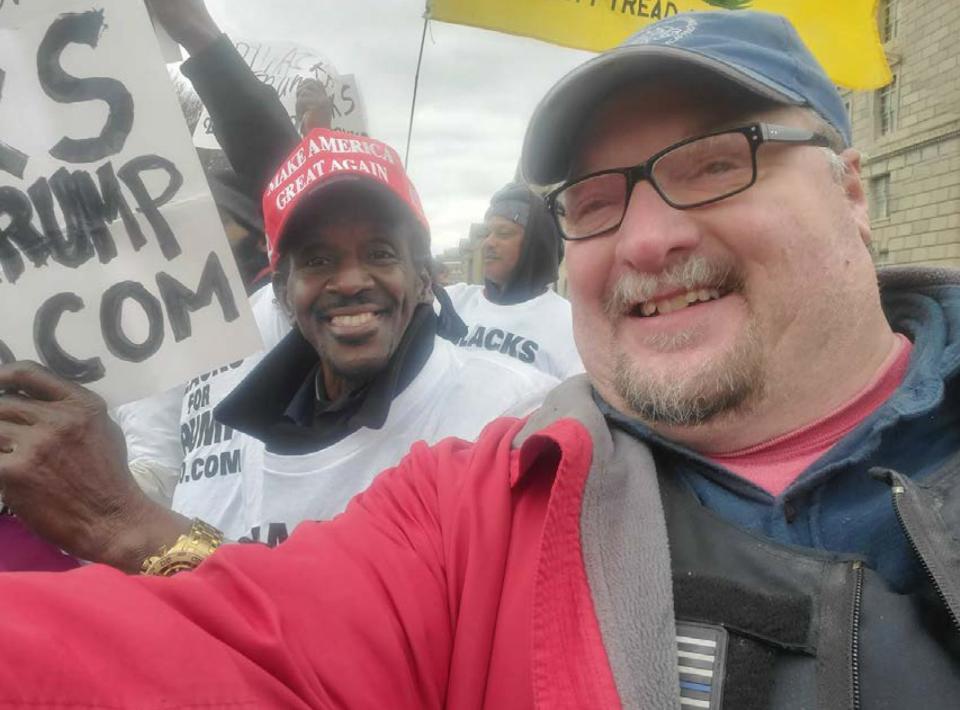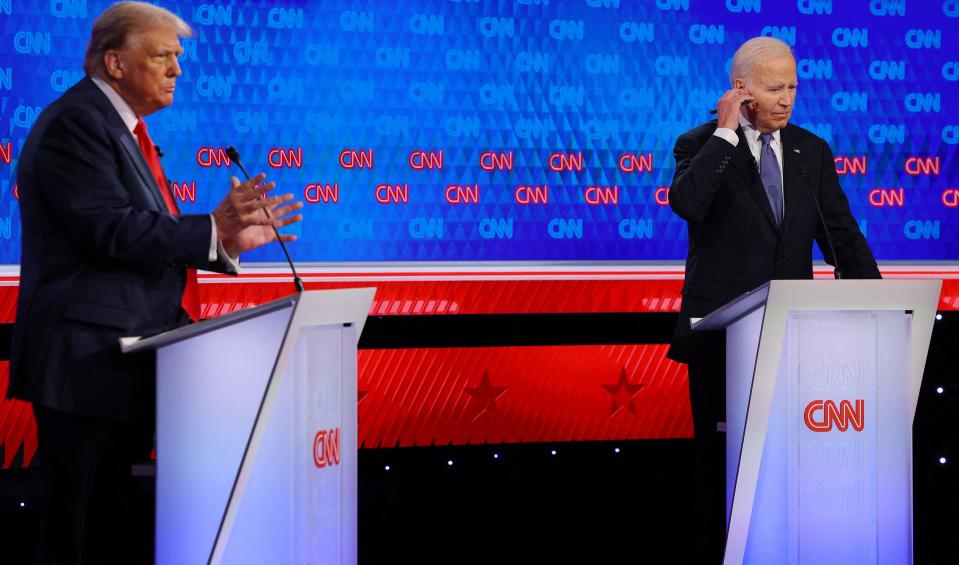Supreme Court narrows obstruction law for Jan. 6 defendants, but maybe not enough for Trump
WASHINGTON ? A federal court will review the charges against former President Donald Trump, thanks to the Supreme Court's Friday ordering the review of an obstruction charge against a defendant in the Capitol attack on Jan. 6, 2021.
Two of the four charges against Trump in his federal election-interference case brought by Justice Department special counsel Jack Smith are based on "obstruction of and attempt to obstruct an official proceeding." The Supreme Court case has potentially broad impact because at least 350 out of the first 1,400 defendants from Jan. 6 were charged under the same law.
But Attorney General Merrick Garland said none of the Jan. 6 defendants face the obstruction charge alone. Even if the charge is dropped against some defendants, other charges would remain.
The Supreme Court ruled 6-3 that the D.C. Circuit Court of Appeals must review whether the obstruction charge was appropriate against Jan. 6 rioters. Congress approved the law, which carries a maximum 20-year prison sentence, to prohibit the destruction of documents or to charge anyone who "otherwise obstructs, influences, or impedes any official proceeding."
Chief Justice John Roberts rejected the Justice Department's expansive reading of what constitutes obstruction, calling it "a novel interpretation (that) would criminalize a broad swath of prosaic conduct, exposing activists and lobbyists alike to decades in prison."
The Supreme Court case was brought by Joseph Fischer, a former police officer in central Pennsylvania who was charged with obstruction for entering the Capitol Rotunda on Jan. 6. He argued the law applied only to destroying documents, which he is not accused of doing, rather than disrupting official meetings of Congress.
Solicitor General Elizabeth Prelogar, representing the Justice Department, argued the “otherwise” phrasing in the law was “a classic catchall” that lawmakers adopted to cover creative forms of obstruction.
Legal experts said the court-ordered review of the law might not lead to dropping charges against Trump because his charges deal with documents, namely that he is accused of conspiring to submit false ballots to Congress from presidential electors.
“There is still a path to convict Trump of obstruction,” said Cheryl Bader, a former federal prosecutor who is now a criminal law professor at Fordham Law School. “Although Trump’s conduct of rallying supporters to storm the Capitol would not fit within the court’s narrow definition of obstruction, his participation in a conspiracy to present a physical slate of fake electors does seem to meet the more limited interpretation.”
What was disputed in the obstruction law?
Legal experts said the Supreme Court's decision narrowed the obstruction charge but didn't close the door on it entirely.
“They took a very narrow reading of the statute,” Kevin O’Brien, a former federal prosecutor now practicing at Ford O'Brien and Landy, said of the justices. “Both sides have a point. The statute isn’t that clear. But it’s certainly a fair inference that they meant to include something broader than destroying or concealing records.”
Congress adopted the law in 2002 after the Enron scandal, when the failed energy firm's accountants were found to have destroyed documents and no charges were available to use against them. The goal was to close loopholes and prohibit additional forms of obstruction.
The disputed language in the law prohibits anyone from “corruptly” destroying or concealing a government record, or who “otherwise obstructs, influences, or impedes any official proceeding, or attempts to do so.”
"It would be peculiar to conclude that in closing the Enron gap, Congress created a catch-all provision that reaches beyond the scenarios that prompted the legislation,” Roberts wrote. The law provides "a list of nearly two dozen means of committing obstruction with penalties ranging from three years to life in prison, or even death,” he wrote.
The chairman of the House Judiciary Committee, Rep. Jim Jordan, a Republican Trump ally, praised the decision for narrowing the scope of the law.
"The Supreme Court's decision is an affirmation of the rule of law and a reminder that Congress – not out of control prosecutors – writes the law,” said Jordan, R-Ohio.
But William Banks, law professor emeritus at Syracuse University College of Law, said 16 of 17 federal judges who reviewed the law for Jan. 6 defendants before the Supreme Court, approved the obstruction charge for Jan. 6 defendants.

How does the decision affect Trump?
One of the charges Trump is facing in Washington, D.C. is based on the precise section of the law that Fischer targeted.
Trump called the decision a “BIG WIN!” in a post on Truth Social.
But legal experts said prosecutors might be able to salvage the charges against Trump because he was allegedly involved in a conspiracy to obstruct Congress certifying Electoral College votes. Trump is charged with trying to get phony ballots from fake electors in states that President Joe Biden won submitted to Vice President Mike Pence during the count.
"In Trump's case that will be a real option," said Randall Eliason, a former federal prosecutor who is now a law professor at George Washington University Law School. "The court recognizes that submitting false evidence could still violate the statute, so it seems like with the fake electors scheme the charges should still survive."

Decision comes after poor showing for Biden in debate with Trump
The decision came the morning after Trump was widely seen as beating President Joe Biden in their first debate of the 2024 campaign.
Biden's voice was raspy and low from the start, which his campaign aides blamed on a cold. Biden stumbled over words and had to correct himself with numbers. On one occasion, the president appeared to lose his train of thought, concluding with "we finally beat Medicare."
Republicans gloated in the aftermath as Democrats debated whether he could be replaced.

Decision 'somewhat limited' for other Jan. 6 defendants: law professor
Derek Muller, a Notre Dame Law School professor, said the effect of the decision "may be somewhat limited" for other Jan. 6 rioters. That’s because many rioters faced other charges such as trespassing, destruction of property or assault.
“The Department of Justice will have to show interference with the records or documents used to count electoral votes and certify a winner, and while that will be harder in some cases, it will be feasible in others,” Muller said.
Garland, the attorney general who said he was disappointed in the decision, said none of the Jan. 6 defendants were charged with only the obstruction charge at stake in the Supreme Court case.
“For the cases affected by today’s decision, the Department will take appropriate steps to comply with the Court’s ruling,” Garland said.
In cases involving multiple felony convictions, legal experts said they do not believe the ruling will lead to drastic changes. Defendants who have been sentenced could ask to vacate their convictions, but that might not make a difference for people with multiple charges.
"I think the U.S. Attorney's office has done a good job of not putting all their eggs in one basket," said Nick Smith, a defense attorney for Proud Boys leader Ethan Nordean, who was sentenced to 18 years.
Jacob Chansley, who became known as the QAnon Shaman for his horned headgear on Jan. 6, is among a group of defendants who pleaded guilty to just one count of obstructing an official proceeding. In exchange, prosecutors dropped other charges. He was sentenced to 41 months in prison and was released early.
If he sought to vacate his sentence, prosecutors could seek to reinstate other charges that were dropped.
"It's not necessarily a get-out-of-jail free card," defense attorney Richard Willstatter said.
In Trump's case, he could ask to have his charge thrown out or Smith could ask a grand jury to to approve updated charges, depending on how the D.C. Circuit interprets the scope of the law in Fischer's case.
What are average sentences in Jan. 6 cases so far?
The main reason defendants challenged the obstruction law was because it carries a maximum 20-year prison sentence. But Prelogar said average sentences have been far lower than that.
The average sentence for a Jan. 6 defendant without a criminal history who committed violence was 10 to 16 months, Prelogar said. The average for a non-violent defendant was six to 12 months.
Among about 50 defendants whose only felony conviction was the obstruction charge, the sentences averaged 26 months, Prelogar said.
This article originally appeared on USA TODAY: How Supreme Court Jan. 6 ruling may have impact on Trump
